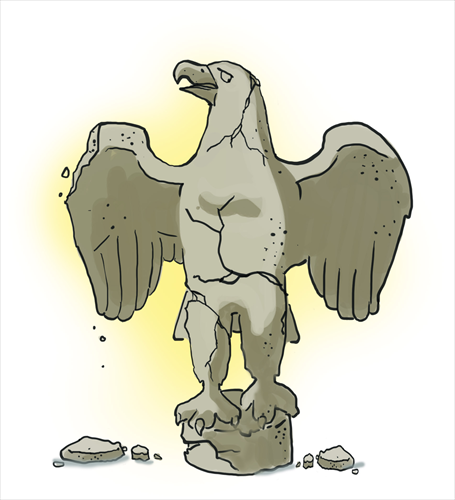Beijing APEC rebuffs US hegemonism

Illustration: Liu Rui/GT
The message to Washington from the Asia-Pacific Economic Cooperation (APEC) Economic Leaders' Meeting in Beijing is that the US must rethink its foreign policy. To remain relevant and competitive in the emerging multipolar world, Americans need a real change of direction.
The APEC meeting made clear that leaders from around the Pacific Rim want to build an inclusive zone of peace and development. The US brought nothing innovative to the table.
The salient features of the meeting are embodied in innovative concepts such as the creation of an inclusive free trade zone, the commitment to connectivity, new Silk Roads, and the Asian Infrastructure Investment Bank (AIIB).
Washington's vision for the Asia-Pacific region, on the other hand, has been the creation of an exclusive anti-China Trans-Pacific Partnership coupled with hard and soft-power containment of China. This counterproductive vision just hit a dead end in Beijing.
An old proverb from the Middle East is apt: "A dog barks, the caravan passes." The world is moving on and the US political elite needs to change their ways.
Washington will not be able to formulate and to effectively implement a new constructive foreign policy until it drops the prevailing elite mind-set. The mind-set of hubris and a desire for hegemonism are roadblocks to the US' future and they undermine US relations with others globally.
The Cold War ended through diplomatic negotiations undertaken by the US and the Soviet Union. Then US president Ronald Reagan and Mikhail Gorbachev ended the Cold War on the basis of mutual respect and mutual benefit. It was a win-win and not a zero-sum conclusion to a dangerous tension-filled period in international relations.
But the US is backsliding into a new Cold War and it will not be easy for the US political elite to adjust to contemporary realities, let alone face the future correctly.
The present bipartisan elite consensus on foreign policy took shape before 2008 so as to be ready for whichever party won the election. The basic line was to continue US "leadership" within the Atlantic/NATO community to maintain the so-called Western order during a period of international change.
Such a policy line required the continuation of the established international financial architecture, tightening the US-Europe relationship, strengthening and globalizing NATO, managing the rise of China and India and blocking Russia.
Policies for managing the rise of China included using Japan as a counterweight in combination with Australia and India. Also in the mix were measures to keep China subordinate to the Western order and its international financial architecture. Furthermore, the US sought to prevent Asian countries from development models outside the "Washington Consensus."
This elite consensus was unrealistic from the start owing to the changing constellation of forces in the emerging multipolar environment. Erosion of the quality of political leadership, increasing internal economic and social problems and the loss of reputation do not bode well for the US and its international position.
The APEC meeting's rebuff to the US vision for the Asia-Pacific region is noteworthy. It indicates support from Asian and Latin American leaders for new innovative ideas and policies suitable to the times.
The two world wars dragged the US into European entanglements which it has yet to discard. Present-day US policy to dominate the Western order and to use NATO to impose it globally is a policy with no future.
The present changing international environment includes new factors such as the BRICS grouping, the Shanghai Cooperation Organization, the AIIB, the land and maritime Silk Road projects, and the new APEC consensus.
The US people are ill-served by their present foreign policy elites with their outdated mind-sets and narcissistic geopolitics.
The caravan is passing. Washington must develop a constructive foreign policy sooner rather than later.
The author is an educator and former senior professional staff member of the Senate Committee on Foreign Relations. opinion@globaltimes.com.cn